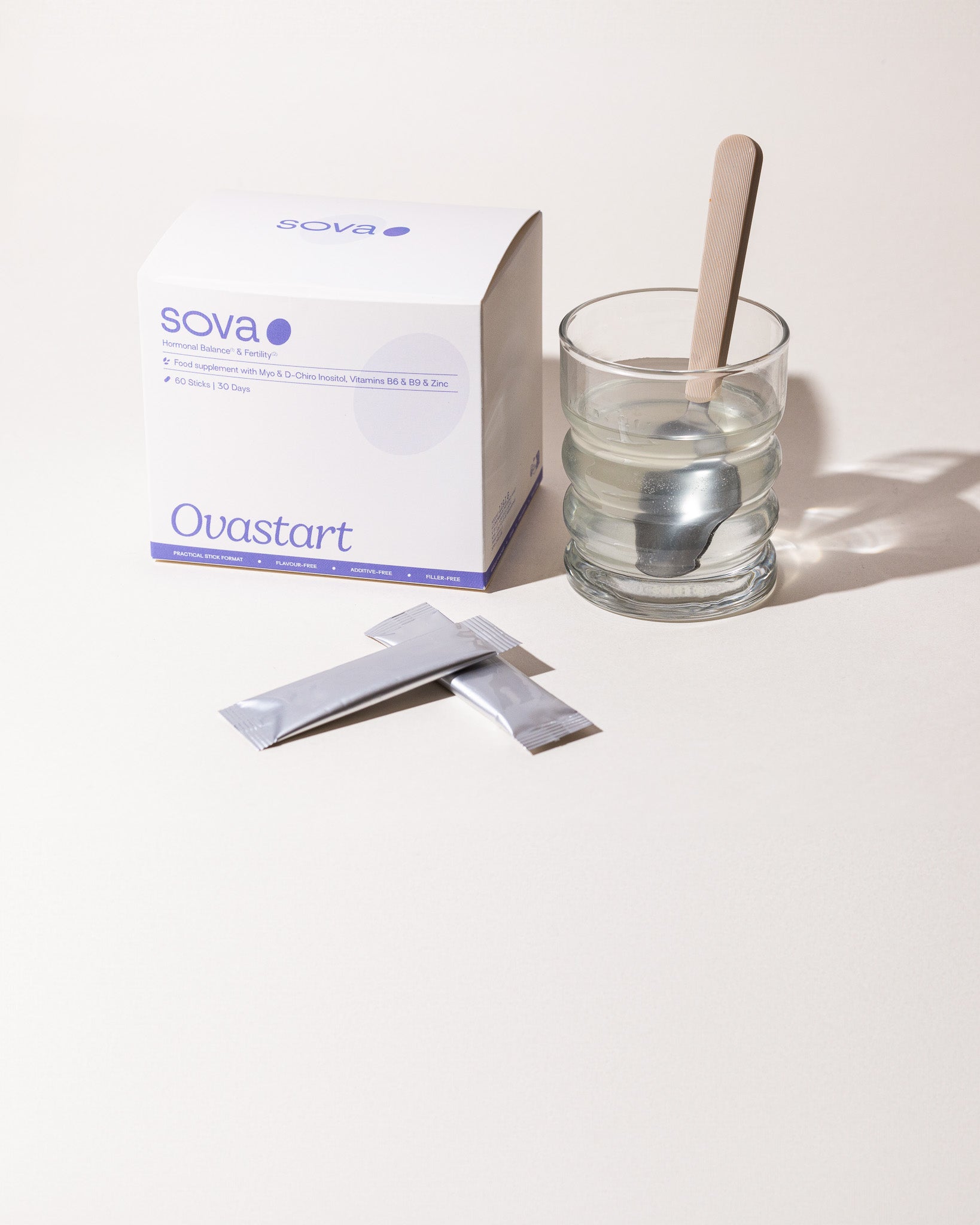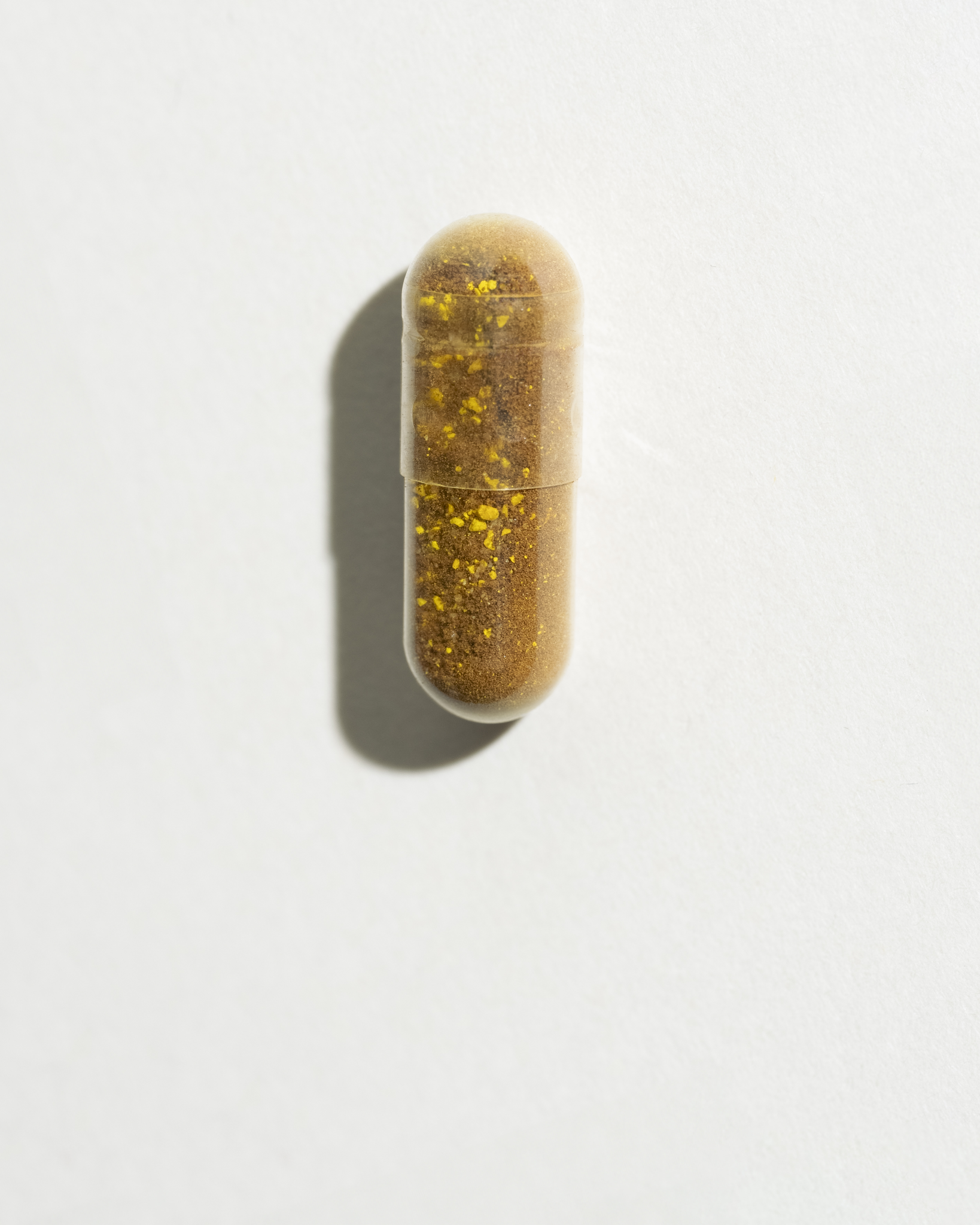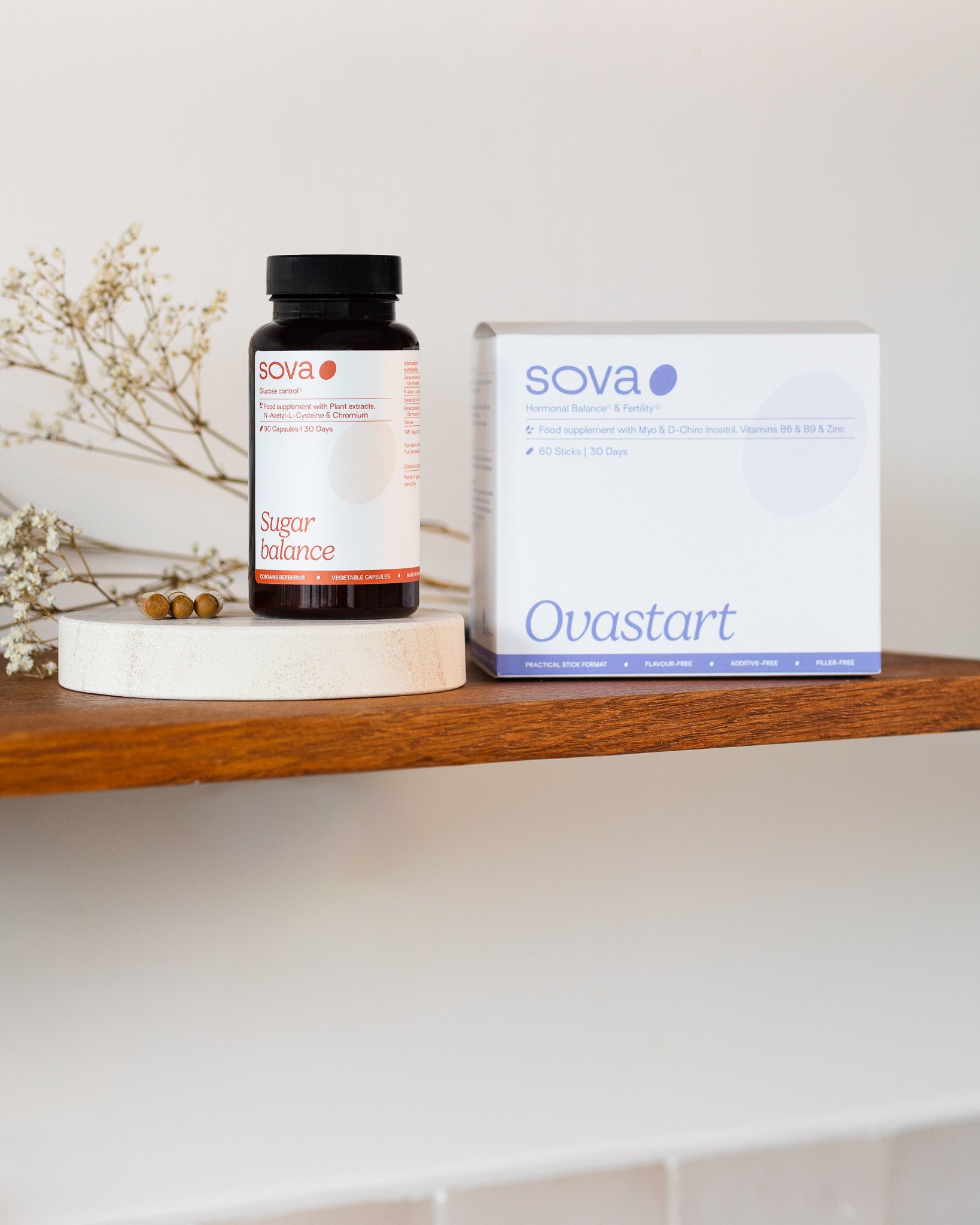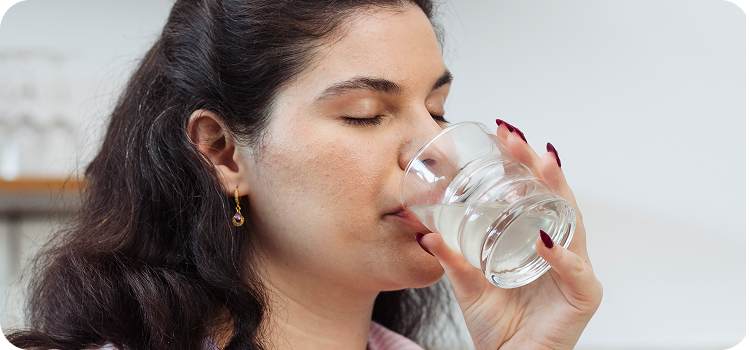Table of contents
If you suffer from Polycystic Ovary Syndrome (PCOS), you may be among the majority of women who struggle daily with their weight: rapid weight gain and difficulty, or even impossibility, to lose it. Unfortunately, this is a problem encountered all too often.
Indeed, women with PCOS are often (but not always!) confronted with being overweight or even obese. PCOS promotes weight gain, which can worsen symptoms such as acne, hirsutism, fertility problems, as well as insulin resistance and metabolic complications like diabetes.
If you are facing this, you may feel like you’ve tried everything. You’ve read articles on PCOS-friendly diets, bought books, listened to podcasts… You think you’re doing everything right, but your weight won’t budge — or sometimes, it even increases. You may feel helpless against this weight gain and the symptoms that come with it.
✨ Not sure where to start? Take our PCOS Product Quiz — it only takes 2 minutes and shows you which supplements may best support your symptoms.
Weight and PCOS: What's the Connection?
Overweightness and obesity are often associated with Polycystic Ovary Syndrome as they affect 40 to 80% of women with PCOS.
Unfortunately, PCOS promotes both, and they in turn worsen PCOS symptoms. So if you feel guilty about being overweight or obese, know that it’s not your fault! Your weight gain didn’t cause PCOS, and it’s not just about “having a balanced diet and exercising,” as many poorly informed professionals say.
👉 You need a lifestyle tailored to PCOS to successfully lose weight!
Weight Loss: Is it Beneficial with PCOS?
Scientific studies are clear: modest weight loss (even just 5–10%) can improve insulin resistance, hyperandrogenism and its symptoms (acne, hirsutism, hair loss), restore more regular cycles, and boost fertility. In the longer term, it helps limit the risk of metabolic complications associated with PCOS.
But if you are not overweight, there’s no need to lose weight — it won’t influence your symptoms. And if you want to lose weight, severe calorie restrictions won’t help you!
Why is it so difficult to lose weight with PCOS?
As a reminder, PCOS is due to hormonal imbalance originating from the ovaries and the brain. It leads to an overproduction of androgen hormones (the more “masculine” hormones such as testosterone, for example). This excessive production causes an imbalance between female and male hormones which can cause a variety of symptoms (acne, hirsutism, irregular cycles, hair loss, etc.).
This hormonal imbalance directly affects your weight, as hormones are responsible for many processes in the body, some of which directly impact weight.
Indeed, excessive secretion of androgen hormones by the ovaries promotes the development of adiposity, i.e., an accumulation of fat in cells.
Furthermore, scientific studies have highlighted a low-grade chronic inflammation in many women with PCOS. One problem with this inflammation is that it promotes the overproduction of androgen hormones, and thus the development of adiposity. This inflammation also alters the chemical structure of insulin, the hormone that regulates blood sugar levels. Blood sugar will then be poorly regulated, leading to insulin resistance, which is found in about 70% of women with PCOS. This insulin resistance, in turn, promotes inflammation, creating a vicious cycle.
The exact mechanisms of this inflammation are not yet fully understood. However, it is known that inflammation is favoured by obesity, insulin resistance, and a high concentration of androgen hormones. It's clear that all these mechanisms are interconnected.
👉 Learn more in our article PCOS and Insulin Resistance.
Rule n°1: Get Rid of Diets!

First and foremost, let me emphases again that it is unnecessary for a woman who is not overweight to lose weight. It will have no impact on her symptoms. However, this does not mean that you should not adjust your diet to fight PCOS better!
Next, it is essential to understand that in the context of PCOS, when aiming to promote weight loss and reduce symptoms, adapting your diet is crucial. But the goal is not to adapt it strictly for 2 months and then nothing as it will hardly have any impact. The objective is to adjust your diet in the long term and improve your overall lifestyle. It's therefore best to proceed step by step.
Unfortunately, no, a drastic diet won't help you lose weight. In the best-case scenario, you might manage to shed a few pounds. But you'll gain the whole thing back and then some as soon as your diet ends! So, whether you have PCOS or not, just don’t start such diets!
Keep in mind that the key is to adapt your diet and improve your lifestyle in the LONG RUN.
Rule n°2: Embrace an anti-inflammatory diet.

Reducing inflammation is extremely important in the context of PCOS (source). It helps to decrease hyperandrogenism, insulin resistance, and also promotes weight loss (when necessary). It also helps to reduce the risks of complications such as type 2 diabetes or cardiovascular diseases.
So, focus on omega-3 fatty acids:
- Opt for oils rich in omega-3 fatty acids such as walnut oil, rapeseed oil, flaxseed oil, hemp oil, or camelina oil.
- Eat fatty fish (mackerel, sardines, herring, anchovies). Be careful with large fatty fish that are highly polluted, such as salmon, tuna, and trout.
- Choose omega-3-rich nuts like walnuts, hazelnuts, almonds, or pistachios.
- Choose omega-3 eggs.
- Use flaxseed pastes in your dishes.
- Omega-3 supplementation is a great ally!
Load up on antioxidants:
- Add turmeric, cinnamon, or ginger to your dishes, smoothies, yoghourts, flavoured waters, etc.
- Drink green tea, but be careful, always take it away from meals, and avoid tea if you tend to be anaemic.
- Create colourful dishes!! Vary your vegetables, spices, and herbs as much as possible!
Balance your dishes:
- A source of carbohydrates: it's the body's fuel, its main source of energy. These include pasta, rice, potatoes, lentils, quinoa, chickpeas, etc.
- A source of protein: they are essential for managing PCOS! They play a very important role in hormone secretion. Plus, they have a satiating effect, meaning they will keep you full. So, they are a great ally when you tend to have cravings! Also, during weight loss, they help maintain muscle mass.
- A source of vegetables: vegetables are fibre-rich! These fibres will not only help regulate your transit but also your blood sugar! Vegetables are also a source of various important minerals and vitamins.
- A source of fat: olive oil is great for cooking, for example. For seasoning, choose an omega-3 rich oil, as mentioned earlier.
Balancing your food is also the basis for regulating blood sugar. When you combine carbohydrates with fibre, protein, and fat in your meal, it helps limit carbohydrate assimilation, so your blood sugar doesn't spike as much!
Favour fibre-rich carbohydrates:
- Whole pasta, brown rice (or semi-brown if you don't like the taste of whole), as well as wholemeal bread or wholemeal bread, for example.
- Eat legumes regularly like lentils, chickpeas, red beans, split peas, etc.
The advantage of these carbohydrates is they’re full of fibres, which helps restrain the glycemic load of your dish, meaning your blood sugar won't rise as much. However, if you tend to be bloated, it's best to keep to one serving per day.
Restrict some foods that are rather pro-inflammatory:
- Restrict sugary products such as candies, cakes, or ice creams. They should only be eaten occasionally, for pleasure. Try to eat them after a well-balanced meal to curb their impact on blood sugar or as a snack (if you combine them with proteins and/or omega-3s).
- Slow down on dairy products. No more than 2 per day.
- Prefer white meat over red meats and fatty meats, which tend to promote inflammation.
- Be careful with fruit juices and soft drinks which are sugar bombs.
- Moderate alcohol consumption and be wary of sweet alcohols like beer or cocktails.
👉 Learn more in Nutrition and PCOS: the key rules of a diet adapted to your type of PCOS.
Rule n°3: Listen to your body
Say goodbye to diets where you have to eat X calories per day, so many grams of carbohydrates, etc. My advice: listen to your body! It's your best indicator because it knows exactly what it needs.
So eat when you're hungry, and don't make the mistake of demonising snacks. If you're hungry between meals, there's no need to feel guilty. You have the right to incorporate a snack. You just need to adapt this snack to avoid a blood sugar spike (say goodbye to fruit or cake eaten alone in the middle of the day, for example).
If you're not hungry for dessert at the end of a meal, don't force yourself.
Try to eat mindfully. Listen to your body and take your time! The feeling of repletion takes time to come, so if you eat too quickly, it will come too late.
Rule n°4: Engage in physical activity

First and foremost, it is essential to combat sedentary behaviour. Try to move as much as possible: walking, yoga, stretching, gardening... Don’t sit around too much. For example, you can incorporate a short walk after meals. This helps promote digestion and reduces blood sugar levels since your muscles will use sugar. A 10-15 minute walk after each meal can be very beneficial.
Next, integrating physical activity is ESSENTIAL! If you engage in physical activity on a weekly basis, it will help you promote weight loss, improve fertility, reduce your risk of cardiovascular complications, improve insulin sensitivity, and thus combat insulin resistance. Physical activity can also help improve your overall well-being. Scientific studies suggest a duration of an hour and a half per week, which you can break down however you like throughout the week.
To be successful in the long run, choose one or more activities that you enjoy and don't force yourself to go to the gym "just to lose weight", particularly if you don't like it. You need to find an activity that you enjoy! Physical activity should not be a chore. At first, it may be a bit tough, but persevere and don't hesitate to try different activities to find one that makes you feel good.
👉 Not sure what type of exercise to choose? Read Best types of exercise for PCOS.
Rule n°5: Create a gentle calorie deficit
A calorie deficit means burning more calories than you eat.
The ideal way to create this deficit is to:
- Eat according to your needs by listening to your body sensations (See Rule n°3).
- Balance and adapt your diet to PCOS through an anti-inflammatory diet (See Rule n°2).
- Incorporate more physical activity into your daily life (See Rule N°4).
I do not recommend calculating your daily calorie intake. This is not necessary and can lead to frustrations, compulsions, and deficiencies. Plus, it can exacerbate eating disorders that are already more pronounced in women with PCOS.
However, if you're struggling to lose weight, don't hesitate to seek help!
Rule n°6: Get support
Support is always beneficial because when you try it alone, you may not know where to start! Moreover, there is a lot of sometimes contradictory information on the internet and it can be difficult to separate the good from the bad.
It's important to take it step by step and set achievable goals. Otherwise, you may face additional mental burden and frustration from not achieving your goals.
So keep in mind that the key is to stick with it in the long run!
If you have eating disorders, weight loss may be even more complicated for you. My advice: work first with healthcare professionals specialised in these eating disorders (dietitian specialising in eating disorders, psychologist, etc.). That's the priority. Once you feel better in this area, you can then focus on your diet more.
Rule n°7: Don't obsess over the scale

Weight is just a number and does not define you. First and foremost, rely on your overall feelings (reduction of your symptoms, better digestion, less fatigue, more regular cycles, etc.) and then on how your clothes feel (do you feel less tight in that pair of jeans, does your stomach feel less bloated, etc.).
Keep in mind that your weight will vary according to your menstrual cycle, what you ate the day before, your digestion, the weather, etc. Yes, before and during your period, your body keeps water up, so your weight will be higher. If you had a slightly larger meal the day before, same thing, you will retain water. If it's hot outside, in summer for example, you may also retain water. If you haven't had a bowel movement for 2 days, it adds weight, which will be reflected on the scale.
My advice: weigh yourself once every two weeks MAXIMUM, excluding during menstruation, and preferably in the morning upon waking up.
Rule n°8: Take the right supplements
Supplements aren’t magic pills — but they can support your weight‑loss efforts and PCOS management when paired with good habits.
✨ Start with inositol.
Inositol (a key ingredient in Ovastart) is the most studied molecule for PCOS. It helps:
- Regulate blood sugar
- Improve ovulation
- Reduce androgens
- Support mood
✨ Support insulin & sugar balance.
Sugar Balance combines cinnamon, berberine, and green tea — all proven to help manage blood sugar and curb cravings.
✨ Add magnesium.
Magnesium helps lower cortisol (the stress hormone), supports insulin sensitivity, and improves mood.
👉 For the best of both worlds, try the PCOS Balance Bundle — Ovastart + Sugar Balance.
📌 Want to know which supplement fits your symptoms best? Take the SOVA Product Quiz and get a tailored recommendation in 2 minutes.
Rule N°9: Weight loss is a marathon, not a sprint
Weight loss with PCOS can be lengthy, sometimes you may plateau for a while, or even put on some weight... It's a true marathon! Forget about those transformation videos where people lose 30 kg in a few months... The slower and healthier the weight loss, the more sustainable it will be!
We really want to avoid the yo-yo effect which is your hormones' worst enemy.
Keep in mind that you're not on a diet, you're simply adapting the way you eat to alleviate PCOS symptoms while trying to create a very slight calorie deficit. Losing 1 to 2 kg per month for 2 years amounts to between 24 and 48 kg, and that's significant! So, take your time and be kind to yourself. It takes time to build castles :)
In summary, if you have PCOS and you are overweight or obese, weight loss is beneficial for reducing your symptoms and limiting the risks of potential complications. However, this weight loss must be holistic and gradual. Indeed, you need to adapt your diet, rely on micronutrition, engage in physical activity, and combat sedentary behaviour. A good overall lifestyle is essential. Working on stress management is also crucial. For example, you could incorporate coherence breathing into your daily routine.
Weight loss is possible, despite what you may hear! However, you need to be patient. Yes, it will take time, but if it can help reduce your symptoms and improve your overall well-being, it's definitely worth it.
Final Thoughts
If you have PCOS and are overweight or obese, weight loss can absolutely help reduce symptoms and long‑term risks. But it has to be:
-
🌱 Holistic (diet, supplements, stress management, movement)
-
🕰 Gradual (no crash diets)
-
💜 Kind (to your body and mind)
✨ Feeling overwhelmed? Take our SOVA Quiz — it’s a simple way to see which supplement (or bundle) fits your PCOS journey and gives you a clear starting point.
Weight loss is possible. It will take time, but each small step brings you closer to relief, balance, and feeling like yourself again.
SOVA was created by two sisters with PCOS who wanted products that truly worked. Our formulas are developed in-house with women’s health and micronutrition experts, using ingredients backed by clinical studies and compliant with European regulations.
- Built by women with PCOS, we know the reality of the symptoms.
- Clinically studied, high-quality ingredients, including patented forms like Quatrefolic® and an optimal Myo-/D-Chiro Inositol ratio.
- Holistic support for hormonal balance, metabolic health, inflammation, mood and cycle regulation.
- Transparent, science-led formulas with no unnecessary additives.

















